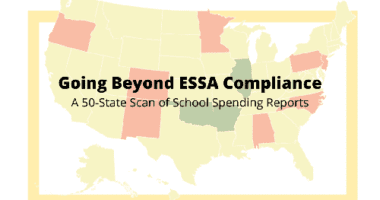What About the Teachers Behind CTE, Early Ed?
The majority of governors have delivered their State of the State Addresses this year, and it looks like the big movers are early childhood education and career and technical education (CTE). While these are undoubtedly important issues, what must not be forgotten in states’ 2014 legislative agendas are polices that will hold schools and districts accountable for educating their students and ensuring that our most effective teachers are in schools with the students who need them most.
Numerous studies show that high-quality early childhood education can be incredibly helpful at boosting academic achievement, especially for low-income students who oftentimes do not receive the same at-home preparation as their more affluent peers. Students who are born into life at a financial disadvantage often fall victim to a system that allows them to fall behind early on. They are more likely to be taught by novice teachers and to attend schools with high teacher turnover rates. Early childhood education programs can help avert achievement gaps before they’ve formed, but only when they are quality programs with effective educators who believe their students can achieve at high levels.
Yet, governors in only a handful of states (Pennsylvania, Utah, and West Virginia among them) talked about initiatives that would hold educators accountable for the performance of their students. Although governors in Missouri, Washington, and Alabama have all promised to add more funding for early childhood programs in their state (Michigan Gov. Rick Snyder proposed a whopping $65 million to expand pre-K), none of these governors mentioned how to ensure that these programs are equipped with teachers who can provide our nation’s most disadvantaged students with the resources they so desperately need.
The same goes for CTE: Done right, it affords high school students opportunities to connect with useful training that will help them be successful in a technology-driven workforce. Done wrong, it can often play out as a form of tracking — moving academically struggling students out of college-prep courses and into, say, mechanics. The benefits of these programs are only seen when they are staffed by teachers who are knowledgeable about the skill they’re teaching and push for the same high standards as any college-prep curriculum. Governors in Alabama, Delaware, and Georgia have all said they hope to grow partnerships with local businesses and industry leaders to get high school students the skills they need to succeed in our global economy. This means that CTE improvements must look beyond mechanics and give students the tools they need for college and career, not one or the other. Prioritizing both gives students choice and upward mobility in their careers.
Proposals like these are great initiatives, but unless governors divert some energy toward ensuring these programs are staffed with best teachers — and that the neediest children have fair access to them — little real progress will be made toward closing achievement gaps in public education that have for far too long plagued our nation’s most disadvantaged students.










